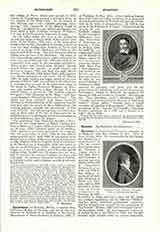

Spontini, GASPARO LUIGI PACIFICO, composer, b. at Magolati, near Jesi, Ancona, November 14, 1774; d. there, January 14, 1851. He was intended for the Church, but decided on a musical career. In 1791 he entered the Conservatorio de’ Turchini at Naples, where he had Sala, Tritto, and Tarantino as masters, and soon displayed his skill in composition. Between the years 1796 and 1799 he had written six operas, which were duly produced in Rome and Florence, and in 1800 succeeded Cimarosa as Court composer at Palermo. In 1803 he settled in Paris, and for a time did not make any marked impression, but in 1804 his “Milton” (one-act opera) attracted considerable attention, and his triumph was assured by the production of “La Vestale” (December 15, 1807) and “Fernando Cortez” (November 28, 1809). He was appointed conductor of Italian Opera at the Odeon in 1810, and brought forward many notable works by various composers.
His “Olympic” (December 15, 1819) he regarded as his best opera, yet it was not a success at first. At length after considerable revision he again presented it on February 28, 1826, when his judgment was finally endorsed by the public.
Removing in 1820 to Berlin, where he was appointed chief Kapellmeister at a salary of 4000 thalers annually and a yearly benefit concert, he composed music for Moore’s “Lalla Rookh”, produced at the Royal Palace on January 27, 1821. His “Agnes von Hohenstaufen” got its first hearing on June 12, 1829. In 1829 he received the honorary doctorate of Halle University, and in 1834 he conducted a performance of his “Vestale” at Hamburg. He visited his native place in 1835, and journeyed to England in 1838, returning to Paris, where he was made a member of the Institute in the same year. A revised version of his “Agnes” was given in 1837, after which he ceased writing operas. In 1842 he left Berlin for good (being succeeded by Meyerbeer), and went to Rome, where many distinctions awaited him. The pope created him Count of St. Andrea in 1844, in which year he returned to Paris. That year is memorable for a visit to Dresden, on which occasion Richard Wagner got up his “Vestale” conducted by the composer. Feeling his end approaching he retired to Magolati in 1850. Although he loomed so large in the first half of the last century, Spontini’s music is now almost on the top shelves. He was not a very loveable personality owing to his egotism, pride, and bad temper, but he was generous to needy musicians and at his death he bequeathed all his property for charitable purposes.
W. H. GRATTAN-FLOOD.

